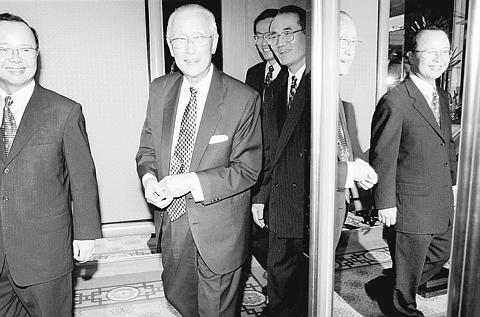The nation's leading cross-strait negotiator yesterday extended an invitation to his counterpart in China, inviting him to push aside whatever disputes both sides may have over "one China" and visit Taiwan as soon as possible.
"A meeting between the two individuals responsible for cross-strait negotiations would be an opportunity to move forward the normalization of cross-strait affairs," said Koo Chen-fu (
"Spring has come and passed and another fall is approaching. The SEF's welcome invitation to Association for Relations Across the Taiwan Strait Chairman Wang Daohan (

PHOTO: CHEN CHENG-CHANG, TAIPEI TIMES
Wang was originally expected to visit Taiwan last fall, but China cancelled the trip after then President Lee Teng-hui (
Echoing comments made by President Chen Shui-bian (
Koo said that it was the spirit and understanding of the 1992 consensus that allowed both sides to hold landmark talks in Singapore in 1993.
"Exchange, dialogue and put-ting aside differences of opinions is the spirit of the 1992 consensus," Koo said.
When asked if Koo hoped Wang could visit within six months' time, Koo said, "six months is what you said, I would hope that it would be sooner."
Koo made his comments yesterday at the first board meeting of the foundation since the new administration came into office. In addition to addressing the stalemate in cross-strait negotiations, the SEF also replaced 13 members on its board.
Reports and comments by government officials yesterday, however, revealed that deep divisions still exist between the two governments on opposing sides of the strait.
Mainland Affairs Council chairwoman Tsai Ing-wen (
In a meeting with legislators' aides yesterday, Tsai also emphasized the need for exchange, dialogue and putting aside the two sides' differences.
Tsai was, however, more explicit in her comments than Koo, saying, "disputes refer to the dispute over `one China.'"
"Of course there are many elements to cross-strait relations, the crux [of the problem] is not `one China'," she said.
Tsai also expressed exasperation at China's unbending insistence on making acceptance of "one China" a precondition for talks.
A commentary yesterday in Hong Kong's Chinese-language daily Ming Pao illustrated the contrast between opinions between Taiwan and China.
In addition to saying that "reunification and one country, two systems" would continue to be China's future aspiration for Taiwan at the annual national policy meeting of leaders in Beidaihe (

NEXT GENERATION: The four plants in the Central Taiwan Science Park, designated Fab 25, would consist of four 1.4-nanometer wafer manufacturing plants, TSMC said Taiwan Semiconductor Manufacturing Co (TSMC, 台積電) plans to begin construction of four new plants later this year, with the aim to officially launch production of 2-nanometer semiconductor wafers by late 2028, Central Taiwan Science Park Bureau director-general Hsu Maw-shin (許茂新) said. Hsu made the announcement at an event on Friday evening celebrating the Central Taiwan Science Park’s 22nd anniversary. The second phase of the park’s expansion would commence with the initial construction of water detention ponds and other structures aimed at soil and water conservation, Hsu said. TSMC has officially leased the land, with the Central Taiwan Science Park having handed over the

AUKUS: The Australian Ambassador to the US said his country is working with the Pentagon and he is confident that submarine issues will be resolved Australian Ambassador to the US Kevin Rudd on Friday said that if Taiwan were to fall to China’s occupation, it would unleash China’s military capacities and capabilities more broadly. He also said his country is working with the Pentagon on the US Department of Defense’s review of the AUKUS submarine project and is confident that all issues raised will be resolved. Rudd, who served as Australian prime minister from 2007 to 2010 and for three months in 2013, made the remarks at the Aspen Security Forum in Colorado and stressed the longstanding US-Australia alliance and his close relationship with the US Undersecretary

‘WORLD WAR III’: Republican Representative Marjorie Taylor Greene said the aid would inflame tensions, but her amendment was rejected 421 votes against six The US House of Representatives on Friday passed the Department of Defense Appropriations Act for fiscal 2026, which includes US$500 million for Taiwan. The bill, which totals US$831.5 billion in discretionary spending, passed in a 221-209 vote. According to the bill, the funds for Taiwan would be administered by the US Defense Security Cooperation Agency and would remain available through Sept. 30, 2027, for the Taiwan Security Cooperation Initiative. The legislation authorizes the US Secretary of Defense, with the agreement of the US Secretary of State, to use the funds to assist Taiwan in procuring defense articles and services, and military training. Republican Representative

TAIWAN IS TAIWAN: US Representative Tom Tiffany said the amendment was not controversial, as ‘Taiwan is not — nor has it ever been — part of Communist China’ The US House of Representatives on Friday passed an amendment banning the US Department of Defense from creating, buying or displaying any map that shows Taiwan as part of the People’s Republic of China (PRC). The “Honest Maps” amendment was approved in a voice vote on Friday as part of the Department of Defense Appropriations Act for the 2026 fiscal year. The amendment prohibits using any funds from the act to create, buy or display maps that show Taiwan, Kinmen, Matsu, Penghu, Wuciou (烏坵), Green Island (綠島) or Orchid Island (Lanyu, 蘭嶼) as part of the PRC. The act includes US$831.5 billion in